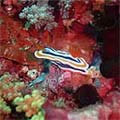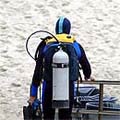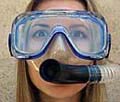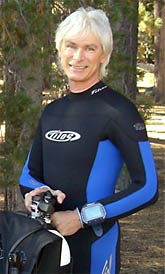« Visiting and diving the Georgia Aquarium | Main | Milestones »
May 25, 2011
About prescription dive masks
As scuba divers we need to be able to see and read our instruments at all times, so how do people who wear glasses cope? For a long time, glasses simply weren't an issue for me, but then came a day where, infuriatingly, I had to squint my eyes to read something small. I thought it was just an eye allergy, but no. For me it was welcome to the world of reading glasses. How does that affect diving?
Obviously you can't wear your regular glasses under a diving mask. One option is contact lenses, but they can get flushed out if you need to clear your mask or get splashed on. Not likely, but it can happen.
Another is getting a mask that can be fitted with optional optical lenses (most masks can be equipped with special lenses made with your prescription), or may even have separate optical windows downward. Many can easily be equipped with optical glass from -1.5 to -8.0 diopters in .5 increments.
Me, I found myself in the category of divers who have good vision but need reading glasses, so I looked into stick-on reading lenses. Stick-on lenses come in many magnifications, are re-usable, and leave no residue, so I tried them first. They usually look like soft plastic segments of a circle. You figure out where they should be in your mask, make sure the mask is totally clean, and then you apply the lens onto the wet mask and let it dry.
I did that before a dive trip to Florida a few years ago. On my first dive at Devil's Den I realized that I couldn't see a thing. I somehow had misinterpreted the instructions and the lenses totally obstructed my normal field of vision. That was so annoying that I took them out and made do without lenses for another two or three years. That's actually possible because water magnifies by about 33%. The magnification effect can be significant and you may find that you can read your instruments or dive computer while diving even if you can't on dry land!
But like most who need reading glasses, I found that I rapidly graduated through magnifications, and soon even the different optics underwater could no longer compensate. So I tried stick-on lenses again. First they just wouldn't stick. That can happen because for some hard-to-understand reason, many dive mask manufacturers insist on engraving their company or brand name at the bottom inside of the glass. Which means the lens is much less likely to stick. I asked around for a solution, and found a dive master who swore by glueing the lenses with something called liquid glass or such.
I bought a tube of it, followed instructions meticulously, but with awful results. The glue smeared, and while it was indeed clear, there was so much optical distortion as to render the inserts useless. Out they came, and I set the font size on my dive computer to maximum.
At DEMA 2008 I came across the folks at Prescription Dive Masks in La Mesa, California. They specialize on dive optics and nothing else, and they even have licensed opticians on staff. I saw them again at DEMA 2010 and decided to give them a shot. With just a week and a half to go before a big dive trip, we sent in our masks, having been assured they'd be back in time.
Not only were they back with time to spare, but the quality was just outstanding. Not only did we get much better optics and a larger viewing area than from generic stick-ons, but Prescription Dive Masks also custom-fitted them to our masks. See the difference between their solution (left) and generic stick-ons (right) in the picture below.

Getting optical inserts done professionally is more expensive than buying generics, but it's well worth it. Not being able to reliably see the data on your dive computer is foolish, as is missing that once-in-a-lifetime shot because you can't quite see the controls or settings on your camera.
So if you find yourself in a vision predicament with your mask, check what Prescription Dive Masks has to offer on their site. Or you can call and describe what you need at (619) 698-2878.
Posted by conradb212 at May 25, 2011 8:53 PM








